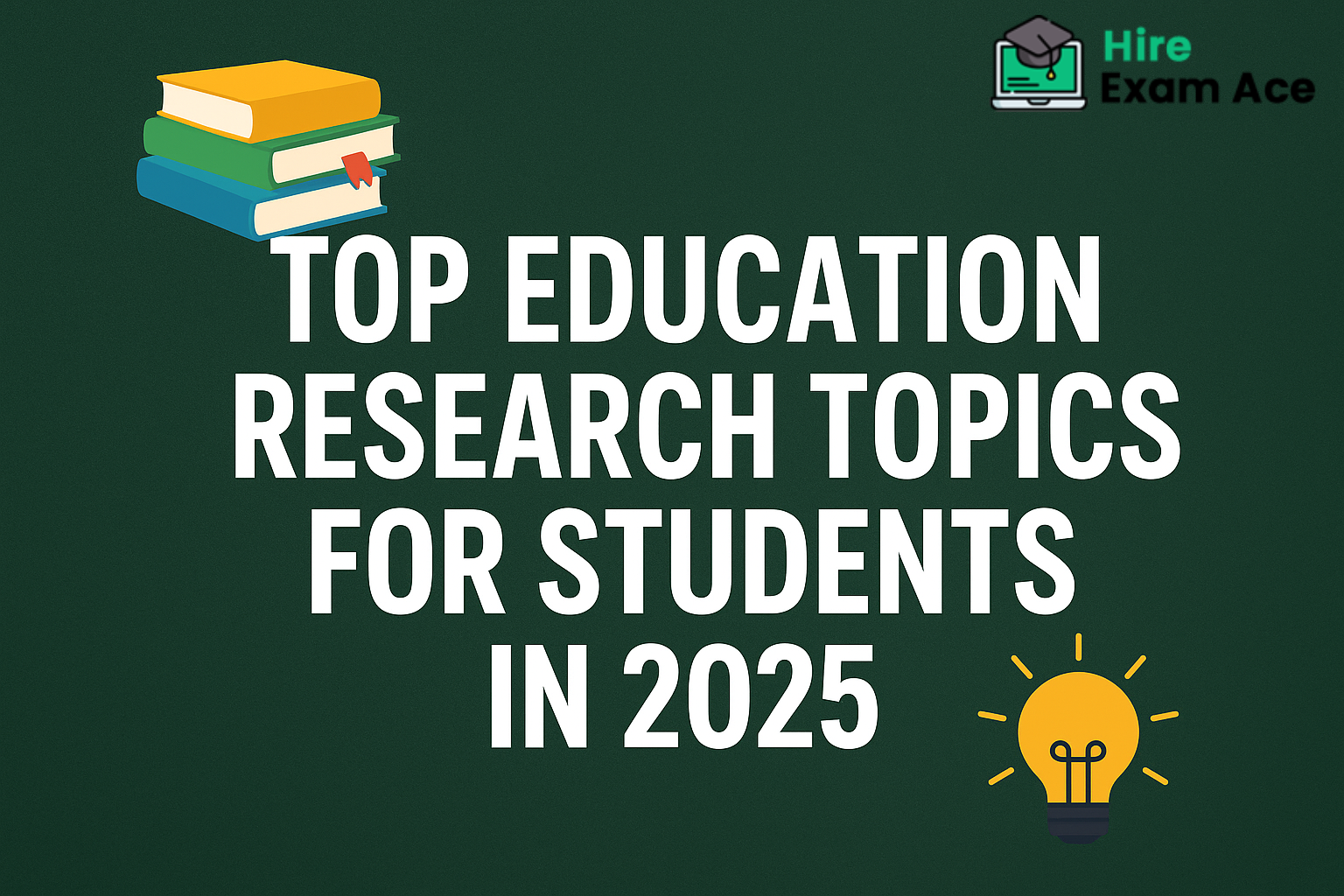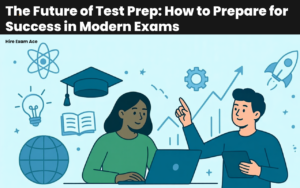Top Education Research Topics for Students in 2025
Education has always been one of the most driven fields of study, and this shows how societies think, learn, and grow. In 2025, education is changing faster than we’ve ever seen before. There is artificial intelligence in the classroom, new ways of digital learning, and there are more and more conversations about social awareness and diversity, including front and center in the digital space, which has meant the scope of studying education has exploded into what we see today.
How you choose your educational research paper winner today could be the difference between a ho-hum paper and a talk that gets people really thinking. When students choose a good, modern paper that aims to do something different, those students stand out in many ways. They engage more with their research and make a mark on the teachers, scholars, and even big companies.
This blog will guide you through everything you need to know why education research matters, how to choose the right topic, and which education research topics for 2025 are trending, relevant, and ready to discover.
Why Education Research Still Matters in 2025
Many assume that with so much information available online, research has missed its edge. In reality, it’s more serious now than ever. Education research helps us recognize how learning happens and how it can be improved through modernization, policy, and technology.
Adapting to the Digital Period
Education went digital. Whether through blended classrooms or computers talking, the ways we used to teach and test kids have changed a lot. Research allows teachers to look into these new ways of. Guiding students to see if they actually help them learn, or if they just serve to throw more roadblocks in the way.
Building Better Learning Environments
Research in education drives transformations in teaching systems, classroom management, and prospectus policy. When students discover how dissimilar learning models impact success, they participate in a deeper consideration of what truthfully works in education. However, with the growing burden of online assessments, many learners now search for qualified academic support or even pay someone to take my online exam to achieve time and maintain performance while focusing on in-depth educational research.
Shaping Future Strategies
Government and educational institutions trust heavily on academic research to shape policy. From impartial access to education to improving teacher maintenance rates, research-backed perceptions form the foundation of future education systems.
In short, education research is not just about writing a paper, it’s about manipulating how knowledge is shared and fascinated in the next age group.
How to Choose the Right Education Research Topic
Deciding on a research area is as exciting as it is hard for any scholar. The good one must excite you and also bring some good value to the education world.
Here’s a clear step-by-step approach to help you choose efficiently:
Identify Your Area of Concentration
Ask yourself which part of education attracts you most technology, psychology, strategy, training procedures, or learning performance? Picking a niche that sincerely motivates you makes the research process pleasurable and supportable.
Check for Relevance
Relevance is everything in 2025. Stay away from any desired dead horse topics that have been drilled to death! Instead, find more fresh, use tech and or social ideas about problems of modern day learning as they tend to be more relevant.
Review Existing Research
Take a while to look at current studies you find on Google Scholar, or search for some contemporary educational blogposts. It is important that you know what lack of knowledge there is, but it is even more crucial that you come up with methods to change such knowledge.
Narrow It Down
A broad topic will give your paper no real direction. As an example, instead of finding out about “Technology in Education”, find out about “The Role of AI in Improving Personalized Learning.”
Ensure Availability of Data
Choose a topic that gives you able data whether by research, seminars or secondary research. Without data, your argument may not be reliable.
By following these steps, you’ll confirm your chosen topic is both controllable and expressive.
Read More: Who Can Professionally Guide Me to Prepare for Someone to Take My ProctorU Exam for Me?
Top Education Research Topics for Students in 2025
Now let’s dive into the most thrilling and research-worthy education topics this year. These have been considered for clearness and better readability.
Technology and Digital Learning
Technology still rules the education sector. The following subjects reveal how digital change is changing stanzas and means of learning:
- The Importance of Artificial Intelligence in Custom- Made Learning: Ways AI-backed systems can match lessons to student ’s own needs.
- The Effect of Gamification on Students Motivation: How reward-based practicing programs make students want to learn.
- Online Tests and Remote Supervision Programs: Risks and advantages of using online exams like ProctorU.
- The effect of social media on grades: does linking up online cause students to learn better or get confused.
- Technology skills and digital learning: should digital learning be counted as a key skill same as reading and math?
Students can look at how technology affects learning in many ways on all of these and fix problems like getting on the internet, keeping private data safe, and students taking part.
Pedagogy and Curriculum Development
Teachers keep finding new ways to teach as they learn more about how children get the best kind of learning. Interesting areas to look at will be as follows in 2025:
- Approachable Teaching in Varied Schools: What about how teachers can be culture aware with their day-by-day lessons?
- Project Based Learning and Student Success: A look at the benefits of active learning over time.
- Reimagining Curriculum for Gen Z and Gen Alpha: What makes today’s students different from ones from before?
- The Future of Competency-Based Education: How leaving behind pass/fail tests is by speed.
- Integrating Critical Thinking into Early Education: Do teaching kids how to think critically help students do better in school?
These topics aid to learn about the core of pedagogy, the most effective way of learning and how to develop teaching methods in the future.
Student Psychology and Inspiration
People in education are often forgotten. They matter just as much for teaching how well people learn. See how in 2025 we focus on mental health and inspiring people.
- Impact of Remote Learning on Student Mental Health: Measuring how exclusion impacts concentration, self-trust and engagement.
- Role of Emotional Intelligence in Academic Achievement: Traveling the connection among acknowledging and shining casts.
- Student Exhaustion in the Digital Age: Considering the mental effects of using technology packed coaching.
- The Importance of Mindfulness Practices in Education: Can destination and heart health boost achievement?
- Motivation Techniques for Online Learners: Which digital engagement policies work best for keeping students motivated?
Picking a topic in this category allows researchers to connect psychology with education offering practical solutions to real classroom challenges.
Educational Policy and Administration
Policy-level research surveys the backbone of how schools and universities operate. Here are current, related thoughts:
- Government Care for STEM Education: How actual are recent STEM initiatives in U.S. universities?
- Educator Retention and Employment Challenges in 2025: What policies can improve job fulfillment for teachers?
- Funding Disparities in Public vs. Private Education: How does unsatisfactory funding affect learning results?
- Inclusive Education Strategies: Assessing how colleges support students with disabilities.
- Estimating the Effectiveness of Charter Universities: Are charter models delivering better results than old-style public colleges?
Policy-based research topics like these can make important academic and social contributions, especially for students following education administration or public strategy professions.
Worldwide and Comparative Education
Education today is worldwide. Students and teachers cooperate across borders through online platforms and universal programs. These topics highlight this worldwide perception:
- Cross-Cultural Teaching Practices and Their Impact on Learning: How can worldwide teaching models be integrated into U.S. classrooms?
- International Learning Initiatives: Examining wide-reaching efforts to decrease illiteracy in developing countries.
- Comparing Education Systems in the U.S. and Finland: Why do some states dependably outperform others educationally?
- Virtual Exchange Programs: How online international collaborations are redefining worldwide education.
- The Future of Universal Online Learning Platforms: Exploring opportunities and challenges in cross-border e-learning.
These topics encourage comparative research that broadens consideration beyond nationwide limitations.
Evolving Trends in Education Research
Significant change in education in 2025 will be caused by AI, data, and immersive tools. These new trends are changing the way people do their skills tests because many now ask for tips from an expert or pay someone to take PMP exam to help stay relevant in this fast-changing world of studying.
AI-Powered Classrooms
AI helps teachers make time and use student’s own way from online marks to quick teaching tech.
Virtual Reality (VR) Learning
VR lets students feel history, science and geography in a shared, real sense.
Hybrid Learning Models
The combination of online and in-person learning is now standard practice. Researching its long-term effects is a major area of concentration.
Data-Driven Decision Making
Universities are now using analytics to track student performance and design better interferences.
Moral Problems in EdTech
There has been a lot of data being gathered therefore, examination into issues like privacy, prejudice and AI in fairness play a major role in the realm of teaching and learning.
As such, learners who are aware of such issues would be able to shed light on how forward-looking the present era of school settings would be.
Guidelines for Writing an Effective Education Research Paper
After making the choice of your topic, the job is now yours to sharpen it into a good research paper. The following guidelines will help you:
Start with a Strong Research Question
The question must be clear, precise, and have enough info for people to look into. Example: “How does gamification change student’s interest in middle school science classes?”
Use Trustworthy Sources
Depend on academic journals, verified reports, and scholarly articles instead of general websites.
Maintain Logical Flow
The author of the paper should have the following: intro, review of written work, how research was done, what was found, to discuss, and if anything was assumed.
Incorporate Real Data
Support your opinions with statistics, case studies, or survey results for higher integrity.
Revision and Proofread
Check for grammatical accurateness, consistency, and formatting according to your institution’s necessities (APA, MLA, etc.).
Following these steps will help you write a proficient, convincing, and high-quality research paper.
Also Read This Blog: How Bonus Questions Help Students Stay Motivated and Involved in Exams
Common Mistakes to Avoid When Selecting a Topic
Even the most dedicated students can fall into common traps. Avoiding these mistakes confirms a smoother research journey:
- Picking Overly Broad Topics: Narrow your focus for clearness and complexity.
- Neglecting Data Availability: Avoid topics with limited sources or unapproachable info.
- Ignoring Your Interest: If the topic doesn’t excite you, inspiration will drop midway.
- Following Trends Blindly: Make sure trending topics still allow for meaningful research.
- Copying Ideas: Always create your unique tactic and quote sources accurately.
A well-defined and original topic not only helps you score better but also contributes meaningfully to academic thoughts.
Conclusion
The education of 2025 will be more lively, based more on data, and handy than before. As learning gets away from tired classroom walls, research on teaching will still have a strong hand in molding the thinkers, leaders, and inventors of tomorrow.
Would your focus be on the science, human mind or rules, your pick of what to focus on can make your paper more meaningful and also memorable.
Find fresh ways of thought, remain curious, and go into rich detail about the things that make you write. Possibly your education research paper could be what helps guide the mental shift concerning how learning happens today.
FAQs – Quick Guide for Students
Q1: What are the most trending education research topics in 2025?
Topics about AI in education, digital learning, student psychology, and hybrid classrooms are among the most popular in 2025.
Q2: How do I pick a unique education research topic?
Look for knowledge gaps in existing studies, focus on your interest area, and confirm your topic connects with present educational trends.
Q3: What makes a respectable education research paper?
A strong paper is well-researched, undoubtedly structured, backed by trustworthy data, and presents original visions.
Q4: Which education fields offer the most research potential?
Technology integration, wide-ranging education, strategy transformation, and emotional learning are currently top research areas.










